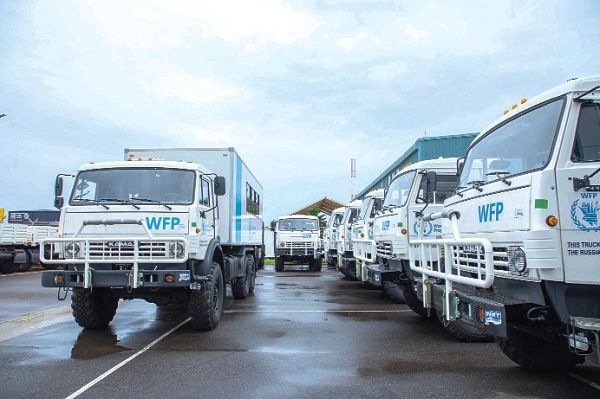
Russian Federation augments transport fleet of UN response depot in Accra
The Russian Federation has handed over 22 Kamaz trucks and five trailers to the United Nations World Food Programme (WFP) as part of a long-standing agreement between the two partners in the area of logistics support for the UN Humanitarian Response Depot (UNHRD) in Accra.
The trucks will increase the transport capacity of the WFP Regional Fleet Hub which supports the Accra Depot to respond to emergencies in West, Central and Southern Africa.
Advertisement
In all, the Russian Federation has donated 97 trucks, 30 trailers, four mobile training clusters, refuellers and spare parts totalling US$10.2 million for the WFP’s global operations.
This was contained in a release issued by the Partnerships and Communications Officer of the WFP in Accra, Ms Vera Boohene.
Handing over ceremony
According to the release that was signed by Ms Boohene, the Russian Ambassador to Ghana, Mr Dmitry Suslov, handed over the vehicles at a ceremony on the UNHRD premises in Accra last Friday.
Present were members of the Ghana-Russia Business Development, the WFP Regional Fleet Manager in Accra, Frank Haubrich; officials from the WFP Headquarters in Rome and the UNHRD, a representative of Kamaz Ghana, as well as staff of the Russian Embassy.
Apart from the WFP Regional Fleet Hub in Ghana, the other hubs which benefitted from the donation are Uganda and the United Arab Emirates.
Most of the trucks and trailers received in Ghana will be dispatched for emergency work in the Central Africa Republic (CAR) and the Democratic Republic of Congo (DRC). A mobile classroom truck, however, will remain in Accra to enable the regional fleet to conduct training for drivers of the WFP fleet.
Additionally, Kamaz will provide a three-year training programme for WFP fleet and workshop managers, mechanics and drivers.
“In the last century, most Africans only knew of the Kalashnikov brand from Russia, as it served them well in their struggle for political independence. In these modern times of economic independence and equity, we hope Kamaz will become the new popular Russian brand in Africa,” Mr Suslov stated.
In 2011, the Russian Federation donated 40 Kamaz trucks to the WFP fleet in Afghanistan, and in 2014 it donated 218 Kamaz trucks, out of which 32 were sent to Ghana for onward dispatch to operations in the DRC and CAR. The rest were deployed to South Sudan and Ethiopia, helping the WFP to augment its operational transport capacity to improve its emergency response facilities.
The release added that “since the trucks were incorporated into the WFP’s Global Fleet, they have covered more than 6.5 million kilometres and transported 350,000 metric tonnes of food to the most demanding and complicated routes.
Without these trucks, the WFP’s only option would have been to use aviation services (airlifts and airdrops), which are much more expensive per metric tonne of food.”
Significance
In her response, the WFP Ghana Representative and Country Director, Rukia Yacoub, said “this donation from Russia will significantly improve the logistical support the WFP Regional Fleet Hub in Ghana provides to emergencies and other humanitarian operations in Africa.”
“By the nature of our work, especially in emergencies, the WFP operates an average of 5,000 commercially contracted trucks on any given day,” she added.
WFP
The WFP is a foremost humanitarian agency worldwide and focuses on saving lives in emergencies and changing lives for millions through sustainable development.
The organisation works in more than 80 countries around the world, feeding people caught in conflict and disasters and laying the foundations for a better future in countries embarking on development.
However, due to the existing peace and minimal occurrence of natural disasters in Ghana, the WFP’s work in the country itself focuses on changing lives, helping to empower smallholder farmers to enable them to have access to more markets, partnering industrial agro-producers to manufacture specialised nutritious foods to reduce malnutrition and working with health authorities to improve the nutritional status of mothers and children.
Among beneficiary regions are Ashanti and the five regions of the north.
Other programmes it is undertaking in the country include strengthening partners’ capacities and supporting the development of relevant policies which will help Ghana attain the Sustainable Development Goal 2, Zero Hunger, by 2030.



